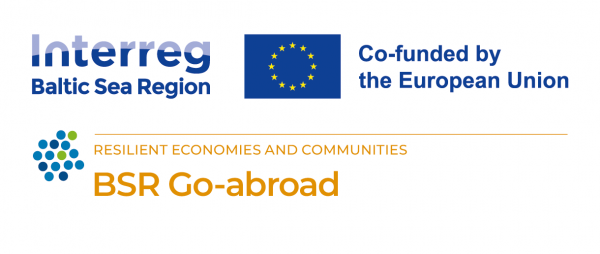
FUI-Bloggen
FUI är förkortningen för forskning, utveckling och innovation. I FUI-bloggen skriver Yrkeshögskolan Novias personal om sitt jobb, forskning, projektverksamhet och andra betraktelser.
Blogginlägg som är granskat av Novias redaktionsråd är utmärkta med nyckelordet "Granskat inlägg".
Vi följer CC-BY 4.0 om inget annat nämns.
Stay ahead of the competition – develop a global mindset

Small and medium-sized enterprises (SMEs) play an important role in the world economy. However, their involvement in international trade is not the same as that of larger companies (Hurmerinta et al., 2024). Even though SMEs make up 99 percent of all companies worldwide, they contribute to less than one-third of the total export value (EPICE, 2022). Therefore, a larger number of SMEs should internationalize their businesses to strengthen their home countries’ economies, thereby contributing to the development of the global economy. To support this, SMEs must receive assistance in developing a global mindset.
Definition of global mindset
A global mindset can be defined as an individual’s capacity to function effectively in highly complex business environments across national boundaries (Andresen & Bergholt, 2017). The concept is strongly related to an entrepreneur’s openness to different cultures and, despite cultural differences, the ability to manage operations in an international setting. Being attuned to cultural differences helps entrepreneurs develop products and services that cater to diverse preferences, needs, and values. Entrepreneurs with a global mindset see the whole world as a single marketplace. Moreover, they proactively seek new opportunities abroad and invest resources, such as time and money, to expand their businesses internationally (Torkkeli et al., 2018). This enables them to expand their customer base, diversify revenue streams, and enhance their resilience. Finally, a global mindset is a competence that can help small businesses to stay ahead of competition. Diversifying across borders reduces the impact of local economic downturns, creating a more resilient business.
Some companies act in the global market from the beginning; others start their internationalization process after a decade or more. Many companies still operate locally or regionally at first, their interest in internationalization develops gradually (see e.g. Johanson & Vahlne, 2009). Managers of companies operating mainly locally do not necessarily have a global mindset. Thus, to be competitive in a global market, these managers need to learn how to operate internationally. The global mindset capability of CEOs has been identified as a key competence for success (Levy et al., 2015). Identifying global opportunities, exposure to different cultures, and diverse ways of thinking encourage innovation. This can be fostered by adapting successful ideas and incorporating varied insights from different markets when developing new business concepts.
A global mindset is something you can learn. Arizona State University (2024) highlights, for instance, the importance of gaining self-awareness, staying curious, and immersing oneself in new cultures as key activities in the development process. For people who want to strengthen their global mindset, it is also important to analyze their own cultural values and to build strong intercultural relationships. The first step can be taken in your own city by hiring people with different cultural backgrounds (Dubberke, 2017). The next step is to leverage the best expertise and partnerships available globally, thereby improving business capabilities. A global mindset helps build stronger relationships with international clients, partners, and employees by demonstrating cultural sensitivity.
Global mindset among Finnish SMEs
A global mindset among Finnish SMEs is crucial, as the Finnish economy needs more medium-sized companies operating not only in neighboring countries but also globally. Finland has a relatively small population, which limits the domestic market. Companies need to look outside Finland for growth opportunities. According to a 2022 growth survey conducted by the Finnish Federation of Enterprises, Yrittäjät, nearly 24 percent of SMEs reported that they have no intention to grow. The same survey revealed that about 20 percent of SMEs exported their products or services or had other operations abroad, a slight decrease from the previous survey. For just under one in five exporting enterprises, exports constitute most of their business (Yrittäjät, 2022). As internationalisation fosters innovation and digitalization (Företagarna, 2019), it is important to encourage small enterprises to grow and operate in international markets. A global mindset is thus a capability that should be enhanced in business acceleration programs and other entrepreneurship-related trainings, since a lack of it may impede the needed growth.
How can the BSR Go-abroad project help?
SMEs are more vulnerable to global crises and external disturbances. However, those engaged in international markets are more likely to recover quickly (Steinerowska-Streb et al., 2022). Therefore, enhancing local market presence and fostering collaborations within the Baltic Sea region will bolster SMEs' resilience by diversifying their market base and establishing local value chains. This is the focus of the BSR Go-abroad Interreg project, which began at the end of 2023 and will continue for three years. (Interreg Baltic Sea Region, 2024)
To accomplish the goal, the project will launch an internationalization program for SMEs, equipping them with the necessary knowledge, tools, recommendations, and networks to implement effective internationalization strategies. The program also aims to develop robust local value chains and foster cooperation between SMEs within the region. To begin with, the participating companies in the project will attend four workshops with various themes. In the first workshop, the global mindset—essentially, the prerequisites for success—is on the agenda. The aim is to create an understanding of why a global mindset is important and how to approach it. The key question is: What kind of company do the participants want their company to become?
In the first workshop, the participating companies are given insights into the importance of having a good market fit. If the products or services of the companies do not seem to match the international market chosen for expansion, there is no reason to proceed. Thus, a conclusion of the workshop is that all internationalization activities start with understanding the customers and their needs. In the workshop, it is also highlighted that there is likely a need to adjust the companies' processes and address language issues. The whole company needs to adopt a global mindset; otherwise, there is a significant risk that the internationalization activities will fail.
To sum up, a global mindset allows SMEs to grow, innovate, stay competitive, and remain resilient in dynamic, interconnected markets. It should be adopted and can be developed, for example, by participating in internationalization programs designed for that purpose.

Sources
- Arizona State University (2024). Developing a global mindset. Thunderbird School of Global Management. https://thunderbird.asu.edu/thought-leadership/insights/developing-global-mindset
- Andresen, M., & Bergdolt, F. (2016). A systematic literature review on the definitions of global mindset and cultural intelligence – Merging two different research streams. The International Journal of Human Resource Management, 28(1), 170–195. https://doi.org/10.1080/09585192.2016.1243568
- Dubberke, S. (2017). 5 Ways to Develop a Global Mindset. https://trainingindustry.com/articles/strategy-alignment-and-planning/5-ways-to-develop-a-global-mindset/
- Interreg Baltic Sea Region (2024). BSR Go-abroad. https://interreg-baltic.eu/project/bsr-go-abroad/
- EPCIE (2022). The New Globalisation: SMEs and international trade – The supply chain is as important as direct exports. https://ecipe.org/publications/smes-international-trade-supply-chain-important-direct-exports/
- Företagarna (2019). Småföretag allt mer internationella. https://www.foretagarna.se/nyheter/riks/2018/november/smaforetag-allt-mer-internationella/#:~:text=Tillv%C3%A4xtverkets%20unders%C3%B6kningar%20bekr%C3%A4ftar%20att%20sm%C3%A5%20och%20medelstora%20f%C3%B6retag,en%20produkts%20olika%20insatsvaror%20produceras%20i%20olika%20l%C3%A4nder
- Hurmerinta, L., Nummela, N. & Paavilainen-Mäntymäki, E. (2024). Boosted by failure? Entrepreneurial internationalization as a cyclical learning process. European Journal of International Management, 22(3), 337-353. https://doi.org/10.1504/EJIM.2024.136483
- Johanson, J. & Vahlne, J-E. (2009). The Uppsala internationalization process model revisited: From liability of foreignness to liability of outsidership. Journal of International Business Studies 40, 1411–1431. https://doi.org/10.1057/jibs.2009.24
- Levy, O., Beechler, S., Taylor, S., & Boyacigiller, N. A. (2015). Global Mindset. Wiley Encyclopedia of Management. https://onlinelibrary.wiley.com/doi/10.1002/9781118785317.weom060094
- Steinerowska-Streb, I., Glod, G. & Steiner, A. (2022). What do we know about small and medium enterprises’ survival in a post-global economic crisis context? Local Economy, 37(4), 259-278. https://doi.org/10.1177/02690942221112042
- Torkkeli, L., Nummela, N., & Saarenketo, S. (2018). A global mindset – Still a prerequisite for successful SME internationalisation? Dominguez, N. and Mayrhofer, U. (Ed.) Key Success Factors of SME Internationalisation: A Cross-Country Perspective (International Business and Management, Vol. 34), Emerald Publishing Limited, Leeds, pp. 7-24. https://doi.org/10.1108/S1876-066X20180000034001
- Yrittäjät (2022). PK-yritysten yritysbarometri. https://www.yrittajat.fi/wp-content/uploads/2022/02/SY_pk-barometri_kevat2022.pdf
Texten har granskats och godkänts av Novias redaktionsråd 5.11.2024.
![]()
FUI-Bloggen
Blogginlägg som är granskat av Novias redaktionsråd är utmärkta med nyckelordet "Granskat inlägg".
Vi följer CC-BY 4.0 om inget annat nämns.
Ansvarsfriskrivning: Författaren/författarna ansvarar för för fakta, möjlig utebliven information och innehållets korrekthet i bloggen. Texterna har genomgått en granskning, men de åsikter som uttrycks är författarens egna och återspeglar inte nödvändigtvis Yrkeshögskolan Novias ståndpunkter.
Disclaimer: The author(s) are responsible for the facts, any possible omissions, and the accuracy of the content in the blog.The texts have undergone a review, however, the opinions expressed are those of the author and do not necessarily reflect the views of Novia University of Applied Sciences.
Posta din kommentar
Kommentarer
Inga har kommenterat på denna sida ännu